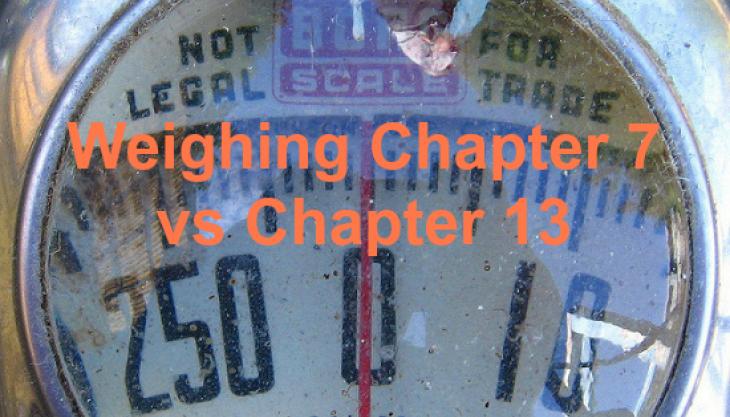5 Things to Know About Chapter 13 Before You Decide Against Chapter 7
Submitted by Rachel R on Thu, 04/28/2016 - 10:18am

How do you weigh Chapter 13 vs Chapter 7?
Image Source: Flickr User Brandon Martin-Anderson
When North Carolina consumers consider bankruptcy, they may lean towards Chapter 13 because they want to repay their debts as much as possible and hate the idea of declaring “total” bankruptcy. However, you should know that Chapter 7 offers complete debt relief that's faster while Chapter 13 represents a major commitment.
Many consumers opt for Chapter 13 when they’re behind on their mortgage because it allows them to catch up on past due balances – although they must still keep up with current payments. However, catching up can be very difficult. If you don’t have equity in your home, struggling to clear a delinquency doesn’t always make sense.
Here’s What You Must Know about Chapter 13 Before You Decide against Chapter 7
#1 Raises must be surrendered in most cases.
Your repayment plan is based upon your current salary. If you get a raise at any point in the five-year Chapter 13 bankruptcy process, that additional money will typically be dispersed toward debts by the trustee assigned to your case. It can be frustrating to work hard, get more money and then have no access to it.
#2 Bonuses, tax refunds, and inheritances must be handed over.
Any windfall such as a bonus, tax refund, or inheritance will also likely go to the trustee, who will distribute it to your creditors. You won’t get any of it. Even a significant windfall can be taken if you have significant debt.
#3 Credit scores usually rebound faster after Chapter 7.
Chapter 13 can be harder on your credit than Chapter 7 even though you’re paying off your debts in Chapter 13. Both represent an initial hit to your bankruptcy, but Chapter 7 begins aging off of your credit while Chapter 13 remains active throughout the repayment period.
#4 Chapter 13 repayments are tough to stick with.
It can be hard to complete Chapter 13 repayment. To be approved by the trustee, your repayment plan must consume all your available income to cover debts. That means no vacation, no ability to save, and no wiggle room in your budget.
#5 Late payments can tank your plan at any stage
If you fall behind on your current mortgage payments yet complete your other payments, you can still be refused a discharge at the end of your plan. Recent rulings in court can tank a Chapter 13 right at the end. All it takes is a single missed payment.
Even though Chapter 13 payments can be tough to stick to, there are situations where Chapter 13 is an effective solution. If you need to hold off a foreclosure, it can be helpful – but Chapter 7 can also do the same.
For many, Chapter 13 is their only option due to the income vs debt limitations on Chapter 7. But those who qualify for Chapter 7 can find life-changing debt relief. Even if you have high earnings, don't assume you won’t qualify – If your debt outweighs your ability to pay, Chapter 7 may be possible.
Many people also choose Chapter 13 due to significant equity in their homes, but up to $70k of equity can be shielded by North Carolina bankruptcy exemptions for a couple, and up to $35k can be excluded for an individual.
The bottom line is, for fast, permanent and sweeping debt relief, Chapter 7 is very effective. For more complicated circumstances with significant assets and equity to protect, Chapter 13 may be better. And in some cases, Chapter 13 may be the better initial solution followed by a conversion to Chapter 7.
The Best Way to Know Is to Speak to a Reputable North Carolina Bankruptcy Attorney.
If you’re tired of fending off debt collection calls, living paycheck to paycheck, and living with financial stress, contact the Law Offices of John T. Orcutt today. Call +1-833-627-0115 now for a free North Carolina bankruptcy consultation at one of our convenient locations in Raleigh, Durham, Fayetteville, Wilson, Greensboro or Wilmington .
Debts Hurt! Got debt? Need help? Get started below!
Serving All of North Carolina
- Bankruptcy Attorneys Raleigh NC (North)
- Bankruptcy Attorney Fayetteville NC
- Bankruptcy Attorney Durham NC
- Bankruptcy Attorneys Wilson NC
- Bankruptcy Attorneys Greensboro NC
- Bankruptcy Attorneys Southport NC
- Bankruptcy Attorneys Wilmington NC
Bankruptcy Attorneys Raleigh NC (North)
6616 Six Forks Rd #203 Raleigh, NC 27615 North Carolina
Tel: (919) 847-9750

Bankruptcy Attorney Fayetteville NC
2711 Breezewood Ave Fayetteville, NC 28303 North Carolina
Tel: (910) 323-2972

Bankruptcy Attorney Durham NC
1738 Hillandale Rd Suite D Durham, NC 27705 North Carolina
Tel: (919) 286-1695


Bankruptcy Attorneys Greensboro NC
2100 W Cornwallis Dr. STE O Greensboro, NC 27408 North Carolina
Tel: (336) 542-5993

Bankruptcy Attorneys Southport NC
116 N Howe St. Suite A Southport, NC 28461 North Carolina
Tel: (910) 218-8682

Bankruptcy Attorneys Wilmington NC
116 N. Howe Street, Suite A Southport, NC 28461 North Carolina
Tel: (910) 447-2987
